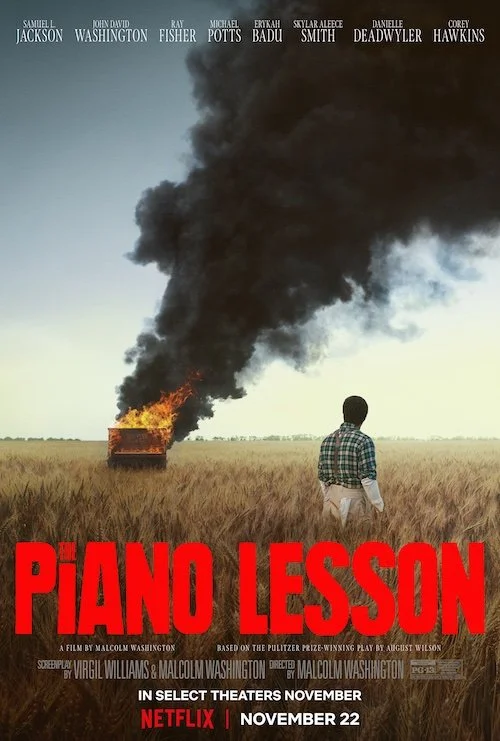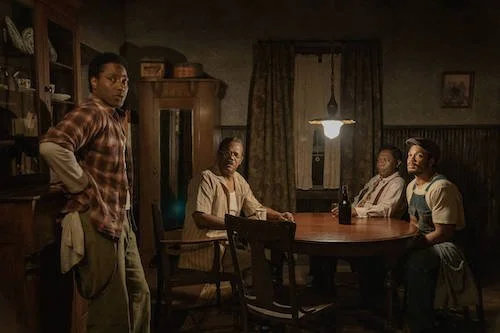The Piano Lesson
Written by Andreas Babiolakis
It’s clear that Denzel Washington and his family have a strong connection with the works of the late playwright August Washington. Denzel Washington directed, produced, and starred in Fences: the best of the projects thus far, particularly for its ability to make you forget that what you are watching is an adaptation of a story that was meant to be seen on the stage. He also produced Ma Rainey’s Black Bottom, which starred Viola Davis (his on-screen partner in her Oscar winning turn in Fences). His son, Malcolm Washington, has carried the torch with his directorial debut: an adaptation of Wilson’s The Piano Lesson. The most artistic and imaginative of the three works, The Piano Lesson had the opportunity to get as figurative, surreal, and creative as possible, which, in return, should have rendered the film the least obvious that it stemmed from a stage play’s tropes. That is not the case, as The Piano Lesson possesses the qualities that many stage-to-screen adaptations carry: great performances and dialogue, but the sensation that we are frozen in place and unable to explore the world around us.
The majority of the film takes place within the Charles household, with a family heirloom — a piano with carvings of ancestors on it — at the epicentre of all the drama of the film. Right after the Great Depression, Boy Willie (John David Washington, who furthers the Washington connection with Wilson’s works) comes to visit the house of his uncle, Doaker (Samuel L. Jackson) and Berniece (Danielle Deadwyler) in hopes of selling this piano. His rationale is that the piano is never played, which Berniece has her reasons for, and they’re the same reason why she refuses to sell the piano. Wilson’s use of the piano is a complicated and nuanced one, seeing as the instrument was once owned by the white family who enslaved the Charles of yesteryear; and yet it now bears the faces of the Charles family. Is this piano a token of the family who owned slaves, or has it been repurposed as a sign of rebirth by the Charles kin?
The Piano Lesson has a lot to say with great thespians to vocalize these talking points, but it still feels held back.
A lot takes place in The Piano Lesson with all of the inhabitants and passersby of the Charles domicile, as we see different relationships, learn much about the pasts of all, and even dive into some spiritual, magical-realist sequences (which, apparently, make The Piano Lesson qualify as at least somewhat of a “horror” film, depending on who you ask; outside of one major moment towards the end of the film, The Piano Lesson is hardly a horror one in any capacity). In that same breath, even though we learn a lot and are aware of the importance of all elements within the film, not much actually appears to happen. At least for two thirds of the film, I found myself hearing much talk and experiencing very little movement. It’s implied that Boy Willie and Berniece have had a rift for quite some time, so when they squabble over the piano, it doesn’t come as much surprise. Any supernatural moments surrounding the piano feel locked into place, and never as though the roof of the house gets proverbially blown off in any way. At all times, narratively and aesthetically, The Piano Lesson feels like it was built for the stage; it doesn’t quite blossom into its full cinematic form.
What elevates The Piano Lesson enough to turn a stagnant picture into one full of movement, purpose, and oomph, will come as no surprise. The acting breathes life into this project, with a party of strong performances from those whom we expect them from (Deadwyler, Jackson), and some surprisingly strong turns from those who still have a bit to prove and show promise (Washington, Corey Hawkins). Even the most trivial moments now feel like a playground for a solid troupe of actors to bounce off of one another, and this is what Malcolm Washington captures the most of. When swelling music sucks any potential for organic emotion out of a scene, it is the acting that brings us back to the intended mindset. Whenever a scene isn’t sure how to balance all of its dialogue for long periods of time, the actors turn these bits into tests of endurance. When the supernatural sequences come from out of nowhere and don’t really feel earned, the actors break our doubts via their convincing responses to the unknown. The Piano Lesson in this version is a portfolio of great acting from numerous people. As a social commentary, nuanced drama, or even a story that dips into surreality, The Piano Lesson is held back enough to be noticeable; fortunately, the acting knows no bounds, and it honestly saves the film from being what could have been a glacial crawl.
Andreas Babiolakis has a Masters degree in Film and Photography Preservation and Collections Management from Toronto Metropolitan University, as well as a Bachelors degree in Cinema Studies from York University. His favourite times of year are the Criterion Collection flash sales and the annual Toronto International Film Festival.






